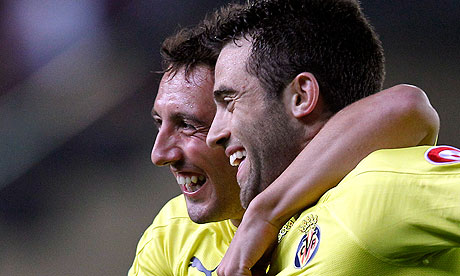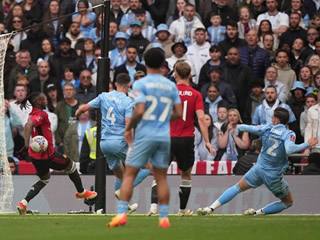Out of Villarreal's old orange grove grows 'the perfect football eco-system'
Posted Tuesday, October 26, 2010 by theguardian.com
With a talented group of youth talent added to astute signings, there doesn't seem to be an end in sight for Villarreal's miracle

Villarreal's Giuseppe Rossi, right, celebrates with Santi Cazorla after scoring against Atlético Madrid.
It was Benjamin Franklin who said nothing in life is certain except death and taxes but what does he know? Sure, he built a few libraries and did some experiments with electricity and catheters and fireplaces and stuff, but he didn't know the first thing about what really matters: football in Spain, that magical world where death and taxes aren't certain at all; where football clubs owe the taxman €627,266,721.38; where a player literally came back from the dead this weekend – Salamanca player Miguel García's heart stopped beating, the doctor who saved him revealing: "He was dead for 25 seconds", and where it's not just that death and taxes aren't inevitable, it's that plenty of other things are.
Things like Manolo Preciado sneaking a crafty fag on the bench, Deportivo de La Coruña leaving you wondering why you bothered being born, and referees dishing out cards like croupiers on crack; like David Villa hitting the post – that's nine for the season now with Spain and Barcelona – or Cristiano Ronaldo revealing his rippling torso. And Marca dribbling all over it. Like Enrique Cerezo looking insufferably smug, Miguel-Angel Lotina looking irredeemably sad and Míchel looking impossibly smooth. Like a pointless replay of a player sighing in slow motion while, back in the actual game, someone's scoring a goal; an interview in AS consisting entirely of one, vital question: "just how great are you?"; and every online article ever, no matter what it's actually about, degenerating into bitter 'debate' about Franco, fascism and nationalism. Or your mum. Like El Mundo Deportivo putting a bunch of tools on its cover. Literally.
Few things, though, are so inevitable as what happened a week ago today. Now, most Monday night games are irrelevant, an afterthought, normally reserved for rubbish teams – since the league decided to shift games there on a whim midway through last season, Madrid and Barcelona have never been involved. Not included in the weekend round-ups, the stats or the reviews, perilously close to the Champions League action whose previews drown them, and quickly erased from the collective conscience, they're La Liga's graveyard shift. Dave Clifton on Radio Norwich.
Last Monday was supposed to be different. Villarreal were facing Hércules. Having won five on the trot, they knew that if they beat Hércules they'd go top for the first time in their entire history. Everyone else knew that if they won, there was half a chance that there might – just might – be a side that could push Madrid and Barcelona. Beaten by Sevilla and Barcelona, and struggling without Sergio Agüero, Atlético weren't it. Nor it seemed, despite their new manager, were Sevilla. And Valencia were going into a nosedive. Maybe Villarreal could be that team instead.
Trouble is, deep down they knew they wouldn't win. Sometimes it's hard to avoid the conclusion that the team that thrives in anonymity and comfort, growing strong in what one columnist described as "the perfect footballing eco-system", can't function properly under pressure. And so it was that Villarreal, despite playing well enough, drew 2-2 with Hércules. For the seventh time in their history, they had a chance to go top. And for the seventh time in history, they blew it. Maybe the "other team" wouldn't be Villarreal, after all.
Or maybe it would. Open Sport this morning, just seven days later, and there's the headline: "The alternative wears yellow." AS agreed: "Villarreal," writes Artiz Gabilondo, "are the only alternative to Madrid and Barcelona." They might have succumbed to the inevitable last Monday but they did win last night: 2-0 against fellow "alternatives" Atlético Madrid. By doing so they confirmed their best ever start, climbed above Barcelona into second on goal difference and positioned themselves a solitary point behind Real Madrid. They became one of only three teams to have won every home match alongside Madrid and Espanyol – and the only one to do so without conceding a single goal.
But if that sounds like they are boring, think again. They've scored more than anyone except Madrid – who've now hit a ludicrous 16 in their past three league matches – and two more than Barcelona. It's true that Villarreal got lucky last night, the referee Ramírez Domínguez denying Atlético one penalty because he decided it was half-time and another because he didn't see a trip on Agüero, but still they were impressive. AS called it an "ode to football", cooing: "marvellous, magnificent, a footballing symphony" and El País said they were "delicious". "Yes, it's true," ran their match report, "there is a team coming up behind those footballing locomotives Madrid and Barcelona: Villarreal, a delight of a team that builds passing triangles, that links up wonderfully, that moves like angels …"
That may be a bit of an exaggeration but they were pretty good. Santi Cazorla, sadly denied the chance to play at the World Cup because of injury, was superb – fast, tidy, tirelessly energetic and precise in possession. Giuseppe Rossi, who scored a really fantastic second, is getting better and better, his movement swift and clever, his touch assured. And Nilmar, finally imposing himself on defenders, did something that this column has never seen anyone do before: beat Luis Perea in a straight sprint. He also created a neat first, slipping a perfectly weighted ball through the gap for Cani to poke past David De Gea. It was all very impressive. It was also all very Villarreal. And that's what makes it so impressive. In fact, that's the point.
When Manuel Pellegrini left for Real Madrid, the club replaced him with Ernesto Valverde. Valverde was popular but he changed Villarreal's style, pushing his team higher, increasing the tempo, exerting greater pressure, and opening the pitch out. The players weren't used to it. It didn't work. After a dreadful start, Villarreal slipped into the relegation zone and although they improved Valverde was sacked midway through the season with the side 10th. His replacement was Juan Carlos Garrido, the B team coach who had taken his side into the Second Division and whose football model was the same as Pellegrini's: a narrow, South American style 4-4-2 with technical, ball-playing interiores encouraged to come inside and flood the centre rather than wingers, the width instead provided by the full-backs. Villarreal improved but were hammered 6-2 by Madrid, could only win half of their last 12 and finished outside the European places (their Europa League slot came courtesy of Mallorca being kicked out by Uefa).
Worse followed. Or seemed to. The feelgood miracle that was built on cold hard cash ran out of cash. At the start of last season, Villarreal promised to give free season tickets to members who suddenly found themselves on the dole; now, with president and owner Fernando Roig's ceramics business hit hard by the crisis, they too needed help. They sold €17m worth of players, Diego Godín joining Atlético, Joseba Llorente going to Real Sociedad, Damian Escudero to Boca and David Fuster to Olympiakos. With Ariel Ibagaza, Robert Pires, Javi Venta and Iván Marcano going, they cut salary costs by almost a third.
They signed evil genius Carlos Marchena from Valencia and Borja Valero from Mallorca – arguably Spain's best outside player beyond the big two last season. The average age dropped by two years, from 27½ to 25½ . The departures of Godín, Ibagaza and Llorente after they hit the town the night before last season's final match reinforced a policy of discipline that paid off when, frustrated and annoyed, the club decided to shed Juan Román Riquelme in 2007. And the squad is a genuinely good group – Marcos Senna, Cazorla and Joan Capdevila, to name but three, are among the nicest people you could meet in football. But still their chances appeared limited. Was the group really good enough? Were the 10 youth teamers called into the first-team squad really going to cut it?
Yes. Villarreal's miracle might have been based on money but it was money well spent. As Roig put it: "When the crisis comes, we'll be ready for it." Not only did they sign good players – and signings still make up the bulk of their first team – but they invested €42m and a lot of time and care in an exceptional youth structure built on an old orange grove, where the approach is identical throughout the club. Santi Cazorla was signed from the Mighty Oviedo at 16. Bruno Soriano, called up for the last Spain squad, is a regular now – and others are coming up behind him; others that have played under Garrido and know his style. Villarreal's style. As Racing coach Miguel-Angel Portugal put it: "Villarreal play the league's best football after Barcelona."
At the same time, Marchena's introduction and Garrido's tough attitude – he admits he has mala leche (bad milk) – has added aggression and edge to a side with a soft underbelly. A side that, given the chance to go top will inevitably blow it and a side that realistically can't challenge for the title because Madrid or Barcelona winning the league is the kind of certainty that death and taxes can only dream of. But a side that really is an alternative for top spot in Spain's other league.
Photos
More»De Bruyne's glamorous Wag stuns in low-cut dress
Tuesday April 23 2024[PICTURE SPECIAL] Coventry 3-3 Man Utd (2-4 pens)
Monday April 22 2024



Your Say